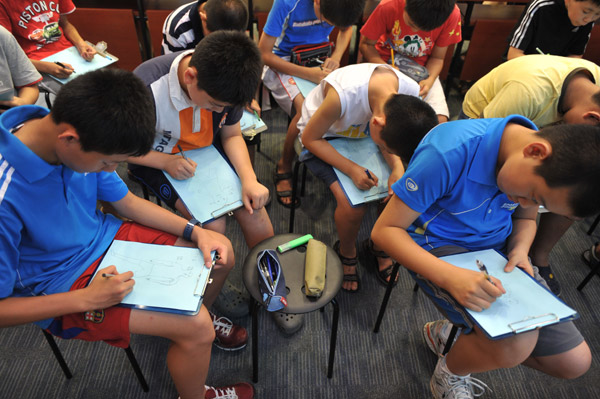Age of Learning
- By Jonathan Jones
 0 Comment(s)
0 Comment(s) Print
Print E-mail
China.org.cn, August 23, 2011
E-mail
China.org.cn, August 23, 2011
|
|
|
Pupils draw images of manliness at a sex education course at Beijing No 2 Experimental Primary School on Aug 17. [Photo / China Daily] |
The introduction of a sex education textbook for Beijing's primary schools marks a constructive step towards better educating Chinese youth about a subject crucial to their health and wellbeing.
The recent introduction of a sex education textbook for Beijing's primary schools has stirred up controversy around the country. Many parents and grandparents are outraged that someone else – even a qualified teacher – is discussing this sensitive subject with their young children. I can understand their feelings; I had the same initial reaction on hearing my daughter was undergoing similar lessons in England.
Our first response to a new approach, however, isn't always the correct one.
In an ideal world, all parents would explain the facts of life to their offspring, eliminating the need for a third party to get involved. In a home setting, families could take their time teaching the basics of sex education and give young minds time to process the information. As the children grew, they would be encouraged to ask their own questions to further understand the concept of sexual relations within a committed relationship.
But even parents with the best intentions often wait too long. Broaching the subject can feel awkward, and the moment when it is right to discuss such intimate matters never seems to arise until the child is well into their teens. By then it is too late.
Children are naturally curious about their own bodies. They are inquisitive enough to be interested in learning and are often not afflicted by the same level of self-consciousness that affects teenagers when talking about the human body.
The parents who recognize this and teach their children are sadly in a minority the world over. As a result, their child can be isolated by a sea of ignorance when they get with their peers and risk ridicule or even corruption by those less informed than themselves.
The steady stream of reports from doctors describing unwanted pregnancies and a rise in sexually transmitted diseases amongst the young are the physical results of a sexually uneducated generation. The mental anguish caused is harder to measure, but a lack of knowledge in later life could at the very least lead to an unfulfilling marriage and the possibility of an early divorce.
Leaving aside any moral judgments, the state educational system has a duty to inform the young of safe and beneficial sexual relations as a part of the nation's wellbeing depends on it.
As China continues to open its doors to the West, it exposes itself to both the good and bad elements of the capitalist way of life. Modern Western media, movies, music and literature can be praised for their diversity and creativity, but underlying most of these enterprises is a drive for commercial gain. The message they contain may be important, but in most cases it is a message in tandem with a search for profit.
For decades sexuality has been used to sell products and influence the way consumers act. As market forces continue to roll eastwards it is the Chinese young who will be in the front line of this sales onslaught as the things they watch, read and listen to will be peppered with sexual references. This glamorizing of sex can lead to a superficial understanding which can be just as harmful as no knowledge at all.
Given that choice, I would imagine the majority of parents would rather their children learned life's fundamentals from a textbook in a caring, scholarly environment where they can discuss anything they don't understand rather than from sitting in front of a thrusting, semi-nude music video playing on a TV or computer screen.
The author is a communications professional, film maker and published writer with a keen interest in life.
Opinion articles reflect the views of their authors, not necessarily those of China.org.cn.







Go to Forum >>0 Comment(s)